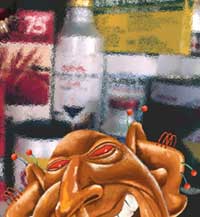THE
BUSINESS OF POISONING
Endosulfan constitutes only a small share of the
pesticide market. So why is the pesticide industry paranoid?
 The
protest against endosulfan in Kerala has become a symbol of struggle against pesticides in
India. The pesticide industry is worried about endosulfan as much as it is of its other
products. As Dave proudly puts it, "I do not defend just one molecule. I am the
president for 200 molecules. We will not ban anything just on the basis that it is banned
in other countries." If endosulfan is banned in Kerala, it could have a cascading
effect in the rest of the country. A successful campaign for banning a particular
pesticide will fuel the fire for other movements as well in India. More pesticides would
be under scrutiny. More communities would feel encouraged to protest. And more pesticides
would be on the hit list. That is something the industry cannot afford to lose out on. The
protest against endosulfan in Kerala has become a symbol of struggle against pesticides in
India. The pesticide industry is worried about endosulfan as much as it is of its other
products. As Dave proudly puts it, "I do not defend just one molecule. I am the
president for 200 molecules. We will not ban anything just on the basis that it is banned
in other countries." If endosulfan is banned in Kerala, it could have a cascading
effect in the rest of the country. A successful campaign for banning a particular
pesticide will fuel the fire for other movements as well in India. More pesticides would
be under scrutiny. More communities would feel encouraged to protest. And more pesticides
would be on the hit list. That is something the industry cannot afford to lose out on.
There are already reports
of a similar problem in Karnataka. The Karnataka Cashew Development Corporation had been
spraying endosulfan on its plantations in Dakshina Kannada and Udipi districts since 1987.
People in these areas are also suffering from strange diseases (see ‘Double
Trouble’, Down To Earth, Vol 10, No 11).
Larger
game plan
The aim of the industry's campaign is, in fact, much larger. It is to strangle all the
voices that are calling for a ban on pesticide products. Worldwide, awareness about
harmful effects of pesticides on humans as well as the environment is increasing.
Governments are buckling under the pressure from the civil society groups to ban harmful
chemicals and pesticides. Last year, Columbia banned endosulfan. The Philippines
reinstated the ban on endosulfan after a long-drawn battle with the industry (see
box: Threats and a ban). Other countries are either restricting
the use of this pesticide or banning it completely. The industry is feeling the heat for
more than one reason. Recently, India signed the Stockholm Convention, a global treaty to
protect human health and the environment from persistent organic pollutants (POPs). POPs
are chemicals that remain in the environment over long periods. By implementing the
Convention, governments will eliminate or reduce the release of POPs into the environment.
In the first phase, 12 POPs have been identified for phase out. Endosulfan is not yet on
this list, but has all the ingredients to make it in the next round.
As consumer pressure is
increasing, corporate bodies are voluntarily moving away from pesticides. "Industry
representatives told me that endosulfan for cashewnut plantations is just a small market.
They are more concerned about endosulfan being used in cotton and in other states. They
said if it is banned in Kerala, it will have repercussions all over India," says
Salam. When Dave was asked whether they felt threatened by such campaigns (like the one on
Kerala) he replied: "It's just that we have to protect our interests and present our
side of the story."
Threats and a ban
It’s not easy to take on the
pesticide industry. The Philippines knows it better |
| The
Philippines banned endosulfan in 1992. The industry led by Hoechst of Germany launched an
offensive. It filed contempt proceedings against the Philippine Fertilizer and Pesticide
Authority’s (FPA), which imposed the ban. It also harassed field workers who came
forward with their personal experiences about exposure to endosulfan. The ban was
successfully challenged by the industry. In 1993, a subsidiary of Hoechst, AG, of Germany, filed another
lawsuit against a news agency, Philippine News and Features, that ran a story on
the possible carcinogenic nature of the insecticide, Thiodan (Hoechst’s trade name
for endosulfan formulation). Even a scientist quoted in the story, Romeo Quijano, was sued
for over US $814,800, according to Pesticide Action Network (PAN), a global anti-pesticide
body.
Citizen and farmers
groups got together to fight back. They were outraged that anyone coming out in the open
about the effects of pesticides was slapped with a lawsuit. Activists were also disturbed
by media offensive initiated by Hoechst’s regional subsidiary that portrayed
pesticide products as safe.
In March 1994, the
Philippine government ordered Hoechst to withdraw its television advertisement on Thiodan
calling it "false, misleading and deceptive". On June 1, 1994, the government
reinstated its restrictions on endosulfan sales and banned triphenyltin acetate, despite
threats by Hoechst that it would pull out of the country if the decision were not
reversed. The ban still holds on the use of endosulfan, except for use in pineapple farms. |
NEXT>>>
|